|
|
|
Sort Order |
|
|
|
Items / Page
|
|
|
|
|
|
|
| Srl | Item |
| 1 |
ID:
085591
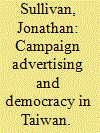

|
|
|
|
|
| Publication |
2008.
|
| Summary/Abstract |
This article sets out a framework for conceptualizing and researching an increasingly important element of electoral competition in Taiwan. Analysing the tone and content of television and newspaper advertising across three presidential campaigns, it provides empirical estimates that challenge some common stereotypes about advertising in Taiwan.
|
|
|
|
|
|
|
|
|
|
|
|
|
|
|
|
| 2 |
ID:
089983
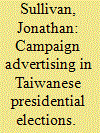

|
|
|
|
|
| Publication |
2009.
|
| Summary/Abstract |
Campaign advertising in Taiwan, particularly at the presidential level, has increased in importance as the political and media contexts in which campaigns are fought has evolved. To further our understanding of this increasingly prevalent campaign tool, the article analyses a large number of television and newspaper advertisements for six presidential candidates across three campaigns. Extending prior research on Taiwan the analysis incorporates three dimensions of campaign advertising: the distribution, composition and tone of appeals. The findings suggest that, for better or worse, many elements of broader political competition in Taiwan are equally present in candidates' campaign advertising.
|
|
|
|
|
|
|
|
|
|
|
|
|
|
|
|
| 3 |
ID:
100501
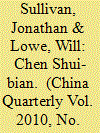

|
|
|
|
|
| Publication |
2010.
|
| Summary/Abstract |
Chen Shui-bian achieved an international reputation for his promotion of Taiwan independence. Whilst that reputation may have been well earned, the analyses on which this conclusion is based are frequently flawed in two ways. First, by using an undifferentiated notion of independence, they tend to conflate sovereignty with less threatening expressions of Taiwanese identity and pro-democracy discourse. Second, by failing to take into account the impact of immediate strategic context, analysts ignore a fundamental element of democratic political communication. In our empirical analysis of more than 2,000 of Chen's speeches, we seek to avoid both flaws by unpacking the concept of independence and taking into account Chen's strategic relationship with his primary audiences. Our findings challenge popular portrayals of Chen, but more importantly they have strong implications for policy makers and students of political rhetoric with regard to current and future ROC presidents.
|
|
|
|
|
|
|
|
|
|
|
|
|
|
|
|
| 4 |
ID:
141111
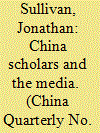

|
|
|
|
|
| Summary/Abstract |
Public interest in China, as reflected in the level of media attention, is burgeoning in the West and elsewhere in the world. This interest is driven by China's increasing presence and importance in the lives of people around the world; and for the same reason is likely to continue growing. Since media discourses are the main way in which Western publics receive information about China, contributing to media reports and helping journalists reach deeper understandings is an important task and opportunity for academics whose specialist knowledge of China is often more nuanced than that of generalist China correspondents. Although developments in the two professions are demanding closer and more frequent interactions, many scholars are reluctant to engage. This is partly due to structural disincentives within the academy, and partly due to obstacles in the scholar–media relationship. Focusing on the latter, the objective of this article is to illuminate how China scholars and journalists currently interact, and to identify means to increasing their efficiency and sustainability.
|
|
|
|
|
|
|
|
|
|
|
|
|
|
|
|
| 5 |
ID:
151585
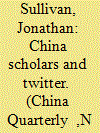

|
|
|
|
|
| Summary/Abstract |
Situating external engagement within the broader context of developments in Western higher education (HE) and technologies that are changing many aspects of academic life, this research note draws on the experiences of a large number of China scholars to assess the merits of Twitter for individual academics and the field as whole. Celebrating its tenth anniversary in March 2016, Twitter has shaken off its earlier image of celebrity stalking and inane ephemera and has become a tool used by many professionals working on China. Despite initial scepticism, many academics have recognized the utility of Twitter for various professional activities, including networking, increasing research visibility, gathering and disseminating information, and building a public profile. As external engagement activities become a routine expectation for academics in many Western universities, social media like Twitter have drawn attention as potentially useful tools. However, there are numerous obstacles to effective use, which this note addresses.
|
|
|
|
|
|
|
|
|
|
|
|
|
|
|
|
| 6 |
ID:
189905
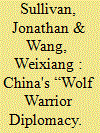

|
|
|
|
|
| Summary/Abstract |
For all the popular interest in “wolf warrior diplomacy,” scant attention has been paid to the internal logics and mechanics of representative communications, notably the intersection with grassroots cyber-nationalism. Centring the connections between official and unofficial actors, we situate Chinese diplomatic communications within the domestic nationalist cyberspace cultures that demand and nourish the “dare to fight” orientation of formal Chinese diplomacy on the international stage. We argue that there is a synergistic interaction between officials and popular nationalism that creates bottom-up incentives to adopt a “wolf warrior” posture, distinct from simultaneous top-down pressures from the central leadership under Xi Jinping to appropriately represent China's “confident rise.” We show through case studies involving MoFA spokesperson and archetypal “wolf warrior” Zhao Lijian, that this interaction extends to sharing unofficial content and ideas in a mutually reinforcing cycle that facilitates a harder edge to diplomatic communications.
|
|
|
|
|
|
|
|
|
|
|
|
|
|
|
|
| 7 |
ID:
193219
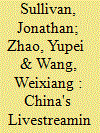

|
|
|
|
|
| Summary/Abstract |
In 2020, hundreds of sub-national government officials and Chinese Communist Party cadres undertook a months-long experiment in livestreaming and social commerce. These sectors are among the most dynamic in the Chinese internet economy and culture, yet Chinese officials have generally resisted engaging with popular and celebrity cultures, even as institutions have begun to expand and modernize their digital operations. Why, then, did a substantial cohort of local officials undertake this experiment? The proximate reason was that they wanted to help local producers hit by the pandemic and to meet their own pending poverty alleviation targets. However, the significance of the case is broader, reflecting the central state and Party's revised thinking on political communications in an era of internet celebrity and self-media and the propensity for local officials to innovate and experiment in the field of digital and popular communication. Investigating empirically how and how effectively livestreaming was employed at the local level helps us to illuminate these dynamics. To facilitate the study, we investigated how officials understood and performed internet celebrity through in-person semi-structured interviews and a three-month virtual ethnographic study.
|
|
|
|
|
|
|
|
|
|
|
|
|
|
|
|
| 8 |
ID:
095561
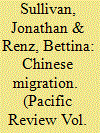

|
|
|
|
|
| Publication |
2010.
|
| Summary/Abstract |
In contrast to Sino-Russian relations at the state-level, regional cooperation between the contiguous Russian Far East and Chinese North East has been difficult to achieve, despite the existence of seemingly natural economic complementarities. This article asks why this is the case and argues that one important stumbling block, i.e. negative reactions to Chinese labour migration, has become less problematic. Situating Russian Far East/Chinese North East relations in a regionalist framework the article compares the salience and framing of major issues in regional relations in Chinese and Russian media at the national and regional levels. Contrary to earlier research, the findings suggest that economic and regional development issues, and not Chinese migration into the Russian Far East, are by far the most salient sets of issues on both sides. However, significant differences in the framing of these issues suggest that a convergence of opinion on the desirability of regional cooperation masks contradictory expectations for the direction of regional development.
|
|
|
|
|
|
|
|
|
|
|
|
|
|
|
|
| 9 |
ID:
163105
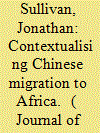

|
|
|
|
|
| Summary/Abstract |
Who are ‘the Chinese’ in Africa? Why are they there? As China’s engagement with African countries intensifies, and the size of the Chinese population in Africa increases, these questions have elicited substantial attention. Many attempts to provide answers, especially in the media and popular publications, are problematically based on uninformed stereotypes and undifferentiated notions of ‘the Chinese’, by implication a homogeneous group lacking contextualisation. Seeking to address such characterisations, this paper uses the digital communications of present and prospective Chinese migrants to provide a more nuanced picture of the motivations, preoccupations and migration experiences of private entrepreneurs and state-owned enterprise workers.
|
|
|
|
|
|
|
|
|
|
|
|
|
|
|
|
| 10 |
ID:
092666
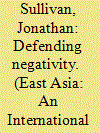

|
|
|
| 11 |
ID:
129461
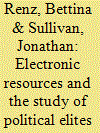

|
|
|
|
|
| Publication |
2013.
|
| Summary/Abstract |
Developments in the information society in Russia have led to the creation of an abundance of online primary texts by political actors and institutions. This article surveys a large selection of official electronic texts with the aim of encouraging more extensive use of online sources and easing researchers' navigation of Russian politicians' use of the internet. While the authors do not claim that online data can replace the insights gained from elite interviews, the article suggests that online texts could be used more extensively as a valuable addition to existing methods applied to the study of Russian political elites.
|
|
|
|
|
|
|
|
|
|
|
|
|
|
|
|
| 12 |
ID:
119199
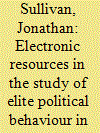

|
|
|
|
|
| Publication |
2013.
|
| Summary/Abstract |
The objective of this article is to survey the abundance of primary source electronic data, and appropriate methods, which could be used to advance the study of elite politics in Taiwan. Research on public attitudes and voting behaviour has benefited enormously from open scholarly access to systematically collected, reliable data resources. Research on elite political behaviour in Taiwan could similarly benefit from the creation of supplementary datasets derived from electronic primary sources. I argue that the primary resources and methods needed are already in place, for instance, to produce quantitative estimates of the policy preferences and ideological positions of parties and individual political actors over time. A variety of political texts created by political actors at all levels of office (and indeed, in opposition) are readily accessible online. With a small degree of processing, these electronic texts can easily be rendered in machine-readable format for analysis by means of computer-assisted content analysis software. Despite successes in other contexts, these data and methods are currently underutilized in studies of elite political behaviour in Taiwan.
|
|
|
|
|
|
|
|
|
|
|
|
|
|
|
|
| 13 |
ID:
139452
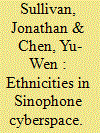

|
|
|
|
|
| Summary/Abstract |
Sinophone cyberspace, the imagined, global space where netizens write and communicate predominantly in Chinese, is a dynamic set of encounters and narratives in the lived realities of ‘Chineseness’, where ‘being Chinese’ is a fluid, sometimes imposed, and often challenged notion. The language and cultural practices of Sinophone communities around the world are highly diverse, refracted by a large number of endogenous factors and responses to the stimulus of exogenous local conditions.
|
|
|
|
|
|
|
|
|
|
|
|
|
|
|
|
| 14 |
ID:
131256
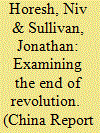

|
|
|
|
|
| Publication |
2014.
|
| Summary/Abstract |
Wang Hui is a significant contemporary Chinese thinker and a key representative of Chinese New Left thought. This article provides a critical review of some of the themes that emerge from Wang's The End of Revolution as a means of situating his position in China's intellectual landscape, with a particular mind to exploring the historicity of Wang's thought as it informs his views. The essay engages some of the key discursive threads in The End of Revolution and provides a critical overview of Wang's positions on neoliberalism, the tension between Western articulations of modernity and China's own self-image.
|
|
|
|
|
|
|
|
|
|
|
|
|
|
|
|
| 15 |
ID:
102761
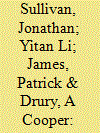

|
|
|
| 16 |
ID:
116640
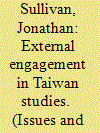

|
|
|
|
|
| Publication |
2012.
|
| Summary/Abstract |
Although Taiwan studies is prone to prevailing trends within the broader academy and in international affairs that are outside of Taiwan scholars' control, there is one area where Taiwan scholars can raise the visibility of the field. Namely, outreach activities in which we disseminate our research and insights on Taiwan beyond the narrow confines of the field and the academy to engage external audiences. The importance of academic perspectives feeding into popular and policy debates, and the value of work that does not conform to the traditional academic currency of peer-reviewed publications are currently being debated across the academy, particularly as blogs and other online outlets have become popular venues for researchers. This article provides a report of a recent collective academic outreach activity (the Taiwan 2012 blog) and a survey of Taiwan scholars' attitudes and current practices. The article demonstrates that there is clearly a market for an authoritative academic resource on Taiwan and that such an exercise can increase the profile of the field and strengthen its collective identity. However, there are also formidable obstacles; crucially the relatively low level of value attributed by individuals to such activities.
|
|
|
|
|
|
|
|
|
|
|
|
|
|
|
|
| 17 |
ID:
107298
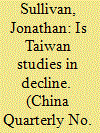

|
|
|
|
|
| Publication |
2011.
|
| Summary/Abstract |
Taiwan studies is confronting several challenges from within and outside the academy to its vitality if not viability. The growing attraction of mainland China to researchers, the encroachment of disciplines and marginalization of area studies, and the closing life cycles of several of the most salient research themes on Taiwan, have all contributed to the sense of a field in decline. This article seeks to provide a more concrete empirical basis for assessing the state of the Taiwan studies field. Drawing on content analysis of journal publications, combined with citation data and a survey of Taiwan specialists, the article addresses a number of key questions about the field.
|
|
|
|
|
|
|
|
|
|
|
|
|
|
|
|
| 18 |
ID:
114784
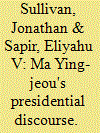

|
|
|
|
|
| Publication |
2012.
|
| Summary/Abstract |
This article focuses on the rhetoric of Taiwan's president Ma Ying-jeou on cross-Strait relations during his first term. The authors argue that his rhetoric varied considerably and put forward a framework for measuring, analyzing and explaining this variation. Analyzing speeches, addresses, etc., they provide empirical assessments of how the content of Ma's public pronouncements has developed over time, how his rhetoric varies according to the strategic context and timing of a speech, and how his discourse compares to that of his predecessor, Chen Shui-bian. In addressing these questions, the article contributes a quantitative perspective to existing work on political discourse in Taiwan.
|
|
|
|
|
|
|
|
|
|
|
|
|
|
|
|
| 19 |
ID:
112426
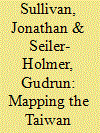

|
|
|
| 20 |
ID:
111305
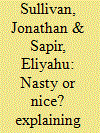

|
|
|
|
|
|
|
|